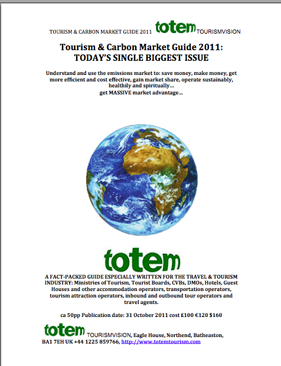Tourism and climate change

Canny is the company that is ready for it
While austerity measures kick in elsewhere, the tourism industry is thriving. International tourist arrivals for the first half of 2011 were a record 440 million worldwide, which is 19 million up on the same period in 2010. These figures indicate that despite increased global prices, job losses and financial uncertainty, travel has become intrinsic to our everyday life. Even when the belts are tightened, we still go places. This is, of course marvelous news for the industry and there is great cause to rejoice except that somehow, it all feels a little bit wrong.
If that’s 440-million people travelling in the first half of 2011, that’s almost a billion in the year as a whole and if the number of international tourists flying to their destinations in the last ten years has grown by 45% with an aviation boom in full swing in Asia, one can be sure that of these almost one-billion, the majority will have boarded a plane. This is where it all gets a bit icky.
The fact is that to get to anywhere beyond next-door, we need to fly. Destinations need us to fly, the livelihood of millions of people need us to fly but every time we fly we emit not far off the equivalent of a UK household’s yearly output of carbon-dioxide. Currently tourism accounts for between 5-12% of all greenhouse gas emissions with airlines contributing to at least 40% of this and rising, of all emissions within the sector (with cars 32% and hotels 21%).
At the recent global climate summit, COP 17 in Durban, an agreement was made between politicians to agree on a date, 2015, for an agreement on curbing greenhouse gas emissions. The tourism industry cannot wait for this agreement. It is one of the most vulnerable sectors to climate change and as this article will demonstrate, action is now kicking off at all levels to curb the impacts. The question is, how effectively can an industry characterized by small margins, bent on growth, make climate change a priority?
Lets start with the airlines. From 1st January 2012 all airlines flying to and from the European Union (EU) have to take part in the EU Emissions Trading Scheme where the amount of carbon they are permitted to emit will be capped. If they exceed the cap, they will have to pay. This is centered on the EU’s commitment to reducing emissions to 30% of their 1990 levels by 2020. This is a measure that should incentivize airlines to improve their energy efficiency to ensure that their emissions are kept to within the cap. Doing so benefits the airlines by keeping running costs down, benefits the passengers by reducing prices and benefits the environment by lowering carbon dioxide emissions.
The directive, however, is being ferociously opposed. China is refusing to pay on the grounds that as a developing nation, it is still developing its airline fleet and so it is difficult to cut overall emissions. India is refusing to reveal its carbon data while the US states it is "complying under protest" but claiming an infringement on the Open Skies Agreement. Delta Airlines is passing the carbon costs onto the passengers at a rate of €6 per return journey, Ryan Air is adding 25p onto one-way routes with the airline industry estimating that the cost of the scheme over the first eight years will be in the region of €8 billion.
The problem is that despite growth in passenger numbers, airlines do not make any money. The competitive nature of the industry combined with the economic slowdown affecting the type of passengers and increases in fuel prices means that any gains in efficiency are slow about 1% a year from technological gains. Due to their cash strapped status, any improvements tend to translate into cheaper flights, which raises the popularity of flying and in turn ups greenhouse gas emissions. Unless airlines improve their emissions, costs are only going to increase, which means that soon it will be too expensive for inefficient airlines to survive.
Other measures for curbing the environmental impacts of airlines involve replacing fossil fuels with biofuels with many airlines investing in biofuel plants. For the time being, however, the jury remains out on the viability of this route due to its reliance on great swathes of land, the competition with food production, which is already threatened due to land degradation and water -shortages and the likelihood of unsustainable production.
It is at the tourist destination that the effects of climate change will be most substantial. Already the impacts are being experienced at lower altitude ski resorts, which have to rely on snow machines to maintain business. Coastal erosion, sea level rises, extreme weather events are all looming in the not too distant future for vulnerable destinations. Becoming carbon neutral is the ultimate goal for forward thinking destinations, or at least reducing emissions and adapting to climate changes. Destinations are now using their ‘low carbon’ credentials as a marketing tool for attracting tourists.
The ‘clean and green’ brand is proving popular not just with tourists but also as an incentive for destinations to really become green and clean. The economic benefits of becoming more energy efficient has encouraged the hotel sector to improve with chains such as Accor using their environmental charter as a key part of their marketing. Updating public transport, investing in clean energy mechanisms, offsetting aviation emissions are all actions destinations are undertaking in attempts to become low carbon.
While the bottom line on travel still comes down to the bottom line, other factors are beginning to seep in. A recent poll by ABTA found that one in five holidaymakers believe that sustainability credentials are essential or important when booking holidays. Responsibletravel.com MD Justin Francis refers to tourists experiencing ‘carbon guilt,’ meaning, "that we no longer feel entirely comfortable boasting about our overseas holidays." Gone are the days when stacking up air miles was glamorous. While some travellers might be prepared to adjust flying habits for the sake of climate change by travelling less frequently or not at all, staycationing and avoiding night flying, which is twice as harmful to the environment than flying in daylight, the majority are simply going to go where they feel like going and when.
The question is might tourists care more if there was clearer information about tourism products ‘green’ credentials? A new direction for the tourism and aviation industry is holiday or carbon labeling, which informs tourists of which holidays/airlines/destinations are most environmental. The benefit of holiday labeling is that it not only gives incentive to the product to improve it also assures the tourist that what they are buying is likely to be well managed.
Offsetting acts as a way of balancing out one’s carbon footprint. It currently costs around £20 to offset a flight from London to New York with the most successful offsetting schemes going to fund clean energy projects. The effectiveness of offsetting is questionable.
A study by the Civil Aviation Authority of passengers at Stansted Airport in 2010 found that despite 56% knowing what offsetting was, 93% did not offset the carbon emitted on their flights. While offsetting has been proven economically and socially beneficial at the receiving end, many claim it equates to little more than putting a bandage on a wound while other question its effectiveness at achieving the long-term carbon savings it claims. Some organisations refuse to endorse offsetting at all, claiming it to be simply a guilt assuager distracting tourists from the real need to reduce their emissions.
So, while action is underway throughout the industry whether it is enough is questionable. Given the high levels of tourist lethargy towards climate change, the tourism industry could be forgiven for not being more active in its approach after all tourists are still flying and the industry expanding. The point is, however, that climate change is not going away and year on year its effects will become more apparent. As this happens tourists awareness will increase and what is currently guilt will translate into more active protestation. Canny is the company that is ready for this, that is currently reinvesting profits into carbon reducing strategies and increasing accountability so that when the tourist demands it, they can be on hand with the goods.
Abby Aron mail@abbyaron.com

Abby Aron is a travel journalist writing for a broad range of newspapers and magazines including The Telegraph, The Times, International Herald Tribune and Time Out Travel guides. She is the author of Buying A House in Morocco, which is a guidebook for people looking to own property in Morocco based on her own experiences of buying, owning and renting out a dar in the Essaouira’s ancient medina.
Abby is currently updating the Tourism and carbon market guide see: more info : HERE
 United Kingdom
United Kingdom United States
United States Asia Pacific
Asia Pacific












































EU entry-exit system delayed again
Carnival Cruise Line hosts Prague getaway for Fun Ambassadors
Council moves to designate Forest of Dean a Biosphere
US tourism hit with UK, Germany travel warnings
Uganda Airlines launching London flights